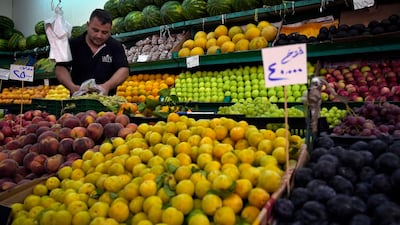Inflation in Lebanon hit an annual rate of about 124 per cent in January as the country's worst economic and financial crises in decades continued amid a political deadlock that has blocked the formation of a new government and the enactment of reforms required to unlock billions of dollars in aid.
Hyperinflation continued for the 31st consecutive month, led by the soaring communication, education, health, restaurant and hotel prices, as well as rising food, water and energy costs, the Central Administration of Statistics' Consumer Price Index showed.
The CPI increased by about 8.43 per cent from December 2022.
“Lebanon’s persistent economic and financial crises have kept price growth in triple digits since mid-2020 and, with the Lebanese pound still losing value both on the parallel market and on the official exchange rate since a 90 per cent devaluation at the start of February, inflation is likely to remain elevated for some time,” Emirates NBD said in a research note on Wednesday.
After hitting 155 per cent in 2021, inflation in the country surged to 171.2 per cent in 2022, the highest in about four decades.
Communication costs soared 331 per cent in January from the same month in 2022, while education, health and restaurant and hotel prices rose leapt 191 per cent, 176 per cent and 174 per cent, respectively.
The costs of water, electricity, gas and other fuels increased 163 per cent annually, while the prices of clothing and footwear, and food and alcoholic beverages rose 161 per cent and 138 per cent, respectively.
Compared with December 2022, the costs of miscellaneous goods and services increased 20 per cent while restaurant and hotel prices climbed 18 per cent.
Health bills, the price of food and non-alcoholic beverages, as well as the cost of water, electricity, gas and other fuels jumped 11 per cent each.
Lebanon's economy contracted about 58 per cent between 2019 and 2021, with GDP falling to $21.8bn in 2021, from about $52bn in 2019, according to the World Bank — the largest contraction on a list of 193 countries.
Lebanon’s tax revenue more than halved between 2019 and 2021 in the face of the deepest economic crisis since the end of the civil war, according to the International Monetary Fund.
“Without taking active tax measures now, the decline in revenue is likely to continue … with severe ramifications, beyond foregone receipts, in undermining the progressivity of the system, and in aggravating inequality and distortions,” the Washington-based lender said last month.
The mis-valuation of customs, excises and Vat at the border is estimated to have caused a loss of revenue worth 4.8 per cent of Lebanon’s gross domestic product in 2022, the fund said.
The World Bank has described the country's crisis as one of the worst in modern history, ranking it among the world's worst financial crises since the mid-19th century.
The economic paralysis has led to a surge in unemployment, with more than half the population sliding below the national poverty line and waves of citizens leaving the country.
Despite the crisis, the country's political elite have yet to enforce critical structural and financial reforms required to unlock $3 billion of assistance from the IMF.
Securing the IMF funds would also pave the way for an additional $11 billion of assistance that has been pledged by international donors at a Paris conference in 2018.
Reforms hinge on the formation of a new government, the election of a president and consensus among the country's political elite.
Politicians are deadlocked over the formation of a new cabinet nine months after parliamentary elections were held and four months after the six-year term of former president Michel Aoun expired at the end of October.


